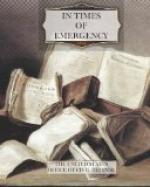THE ATTACK WARNING SIGNAL. This will be sounded only in case of enemy attack. The signal itself is a 3- to 5-minute wavering sound on the sirens, or a series of short blasts on whistles, horns or other devices, repeated as deemed necessary. The Attack Warning Signal means that an actual enemy attack against the United States has been detected, and that protective action should be taken immediately. This signal has no other meaning, and will be used for no other purpose.
THE ATTENTION OR ALERT SIGNAL. This is used by some local governments to get the attention of citizens in a time of threatened or impending natural disaster, or some other peacetime emergency. The signal itself is a 3-to 5-minute steady blast on sirens, whistles, horns or other devices. In most places, the Attention or Alert Signal means that the local government wants to broadcast important information on radio or television concerning a peacetime disaster. (See Chapter 1 of Major Natural Disasters section of this handbook.)
WHAT TO DO WHEN SIGNALS SOUND
1. If you should hear the Attack Warning Signal—unless your local government has instructed you otherwise—go immediately to a public fallout shelter marked like this, or to your home fallout shelter. Turn on a radio, tune it to any local station that is broadcasting, and listen for official information. Follow whatever instructions are given.
If you are at home and there is no public or private shelter available, you may be able to improvise some last-minute protection for yourself and your family by following the suggestions in Chapter 5 (pages 33-38) of this handbook. As a last resort, take cover anywhere you can.
2. If you should hear the Attention or Alert Signal, turn on a radio or TV set, tune it to any local station, and follow the official instructions being broadcast.
DON’T USE THE TELEPHONE
Whichever signal is sounding, don’t use the telephone to obtain further information and advice about the emergency. Depend on the radio or television, since the government will be broadcasting all the information it has available. The telephone lines will be needed for official calls. Help keep them open.
LEARN YOUR COMMUNITY’S SIGNALS NOW
As mentioned before not all communities in the U.S. have outdoor warning systems, and not all communities with warning systems have adopted the two “standard” warning signals.
You should therefore find out now from your local Civil Defense Office what signals are being used, in your community; what they sound like; what they mean; and what actions you should take when you hear them. Then memorize this information, or write it down on a card to carry with you at all times. Also, post it in your home. Check at least once each year to see if there are any changes.




